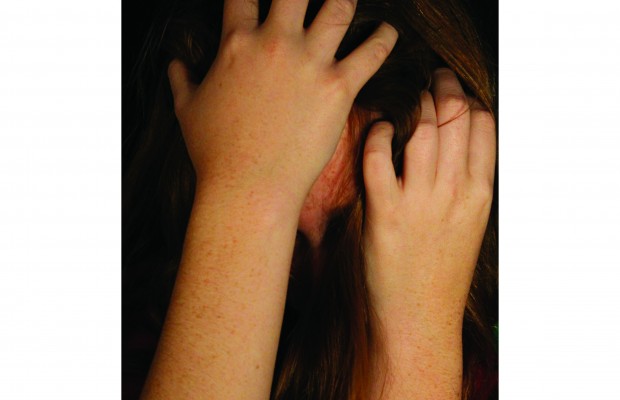Finding peace of mind

High school life is fast-paced: filled with schoolwork, social media, volunteering, friends, jobs, and more. With so much simultaneously going on, many high schoolers struggle with mental health disorders such as depression and anxiety.
Kelly Welch, the assistant principal of athletics, recognizes the difficulty students have in maintaining a balance.
“I think that over the years that I’ve been an administrator here, we’ve seen an increase in the number of students (who have mental health issues),” Welch said. “There’s a lot of things that go on in society that students see through social media or in their peer groups, and just don’t know how to handle it and it becomes very stressful.”
To keep up with the copious amount of schoolwork and to keep their grades afloat, students often have to stay up late. According to Nationwide Children’s Hospital, teenagers on average get about seven and a half hours of sleep nightly, when they should be getting at least 10. Lack of sleep combined with the stress from school causes many students to have a higher probability of developing several mental illnesses.
“I feel like I stay up super late every day because I have a lot of schoolwork, especially with the harder classes that I take,” Emily Adams, sophomore, said.
In addition, students may feel obligated to succeed in school because of pressure from the people around them.
“If the student is in a lot of academically rigorous classes that they don’t feel prepared for, or they don’t feel that it’s what they want, (then it can become stressful),” Welch said. “Maybe they’re getting pressure from another place. Maybe it’s parents, maybe it’s an older sibling, to (the point) where they feel they have to do it.”
While these factors increase stress in students, mental illness has distinct causes despite similar yet more severe symptoms.
“I feel like sh*t everyday and people just think I am really rude because I am depressed,” Abby*, a student at NPHS who struggles with a diagnosed mental illness, said. “My teachers are actually really chill about it. If I say that an assignment is going to be way too much stress on me, they’ll modify it.”
The school staff tries to help those who are having a hard time coping with mental issues especially with rise of stress and mental health issues among teens. However, it’s not always easy for people if they don’t know the person is struggling.
“Mental illness is not a thing you can just see,” Jessica*, sophomore, said. “You just look exactly like healthy people, so I think people just don’t understand you hurt on the inside.” She has been struggling with depression and anxiety since sixth grade.
Jessica also said she doesn’t like to share with people around her because “people don’t know how to act around people with depression and anxiety and stuff.”
Even though it may be difficult to share with others about personal problems concerning mental illness, it is important to reach out to sources for help.
“Because there’s been an increase (in poor mental health), there’s also an increase in available resources that we can try to provide a student with,” Welch said. “A lot of our teachers are also a great first resource for students. Sometimes that’s how we find out about a lot is that students tell teachers, and then the teachers help the student get help. So, ask. Ask for help. Seek the help.”
The road of an uphill battle
Nowadays, depression and anxiety have become banal terms, used by the majority of high school students to describe how they are coping with the seemingly endless homework and extracurricular activities. But for some, these increasingly mainstream feelings are a bigger issue than others may think.
For sophomore Jessica*, mental illness has been an ongoing struggle. “I was sent to the ER after trying to kill myself for the second time and then I went to a psychiatric ward for a week where they diagnosed me,” Jessica said. “I didn’t think I had anything wrong with me. I thought everyone was sad and had suicidal thoughts.”
This distress became visible when Jessica’s academic performance began to decline. “My teachers have high expectations for me and I feel really bad because I can’t live up to them. Sometimes I get extensions and I can’t even turn it in by that date and I just feel like sh*t because the other kids will ask why I have not done any of the assignments and I just don’t know what to say.”
Other students suffering from mental illness can relate to Jessica’s challenge of maintaining the balance of school and mental health.
“There have been times when I have missed a lot of school, being in a mental hospital,” sophomore Abby* said. “I just can’t focus and I just don’t feel motivated.”
When coping with the effects of mental illness gets especially difficult, students often need to take a break from school. This can be uncomfortable, however, especially when people do not understand their need to escape.
“The first time I missed a few of days of school doing that, I said I took a mental illness day. But people, mostly peers, said a lot of (stuff) about me. So now I just say I’m sick,” Abby said.
Many students with mental illness, like Abby, can relate to the challenge of being open about these feelings and the hesitation in disclosing experiences out of fear of being treated differently.
“After I came back from the hospital, I just said I got really sick and had a viral infection,” Jessica said. “I just think people don’t know how to act around people with depression and anxiety.”
Stigma
Even though one in four adults in the United States suffer from mental health issues, there remains ambiguity as to what having a mental illness means.
“Individuals with mental illness are stereotyped as dangerous, unpredictable, and as weak willed,” according to Canada Mental Health Association (CMHA-NL). These categorizations are still acknowledged today due to a lack of information promoted by the misportrayal in the media.
Jackie Henderson, who has been a marriage and family therapist for over 50 years, has had her fair share of exposure to the stigma surrounding mental illness.
“When you use that word mental illness, it sounds really weird, like there is something wrong with you,” Henderson said.
Mental illness, defined by the National Alliance on Mental Illness (NAMI) as “a condition that impacts a person’s thinking, feeling, or mood and may affect his or her ability to relate to others and function on a daily basis,” this affects a large number of adolescents.
“A lot of people with these problems experience them in high school. This is a time for big change, a time when you are exposed to different experiences. Drugs are available, alcohol is available, relationships with your peers, achievement issues, relationships with your parents (can all be factors),” Henderson said.
These problems are caused by a combination of brain chemistry, past trauma, family history, and environmental factors.
“Some mental illnesses have been linked to abnormal functioning of nerve cell circuits or pathways that connect particular brain regions. Nerve cells within these brain circuits communicate through chemicals called neurotransmitters. Psychological factors that may contribute to mental illness include: severe psychological trauma suffered as a child, such as emotional, physical, or sexual abuse, an important early loss, such as the loss of a parent, neglect, and poor ability to relate to others. Certain stressors can trigger an illness in a person who is susceptible to mental illness,” according to WebMD.
“A lot of people think it’s just a thing that you can turn on and off whenever you want, when that is not true. It’s not just a state of mind,” Camila Wise, senior, said.
The rise of social media has also negatively affected those vulnerable to or already with mental illnesses.
“A study of 162 people with a family member afflicted by a mental illness revealed that 83 percent experienced at least one psychological factor of associative stigma,” according to CMHA-NL, “Of the group affected by stigma, 20 percent reported suicidal thoughts versus only three percent of the non affected group.”
“A lot of (people say bad things about me) on Instagram, like comments, DMs, people just being generally annoying,” Abby*, a sophomore struggling with depression and anxiety, said.
The effect of social media on mental illness is not limited to mean comments.
“Some people say things like ‘I’m so depressed because all of this homework!’ and they don’t really grasp the full concept of what it actually means to be mentally ill which can be hard with those who actually have a problem,” Wise said.
Jessica*, a sophomore who suffers from depression, believes that the intangibility of mental illness can lead to misconception.
“I think it is just a topic that is commonly avoided in school and stuff and everywhere else so when you encounter someone with a mental illness you don’t know how to respond,” Jessica said.


